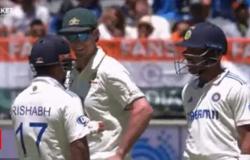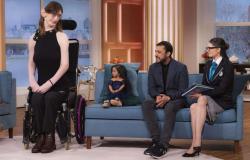Kai Höss and his 87-year-old father, Hans Jürgen Höss, recently confronted their family’s legacy by participating in the 2024 documentary “The Commandant’s Shadow.” Seeking to face the intergenerational trauma caused by Rudolf Höss—the notorious commander of Auschwitz and principal architect of the Holocaust—they met with a survivor of the concentration camp, bringing decades of silence and personal turmoil into the open.
“The most powerful thing for me, what touched my heart, was meeting this woman, at 90 years old, who suffered in the concentration camp, and that she was in our house and had coffee with us and saw her smile,” Kai expressed, according to La Opinión.
Hans, who read excerpts from his father’s memoirs for the first time and visited the site where Rudolf was executed. Kai recalled, “You could see him in tears.” Standing silently with his walker, Hans remarked, “My father received the just punishment for his crimes.”
The emotional journey left a deep impact on Kai as well. “That week I had my heart broken. I burst into tears every day at different moments. To see this factory, this thing, that my grandfather created to exterminate people,” he said. Reflecting on the magnitude of the atrocities, he added, “We recorded on platforms where trains arrived with Jews from all over Europe; they were moved like cattle to Auschwitz; some died from the conditions of the journey. It’s one of the deepest marks that has remained in my heart.”
As teenager, Kai discovered his family’s dark secret. While in sixth grade history class, he learned about Rudolf Höss. “Evidently, I started to pay attention because it sounded familiar to me. I realized that it was our surname, with the same spelling that appears on my birth certificate,” he recounted. Curious and unsettled, he approached his mother, who confirmed the unsettling truth: “Yes,” she told him, “he is your grandfather.”
“It was shocking, incredible. Who wants to have such a person as their grandfather?” Kai said. “It was hard for me to process that I am related to someone who did something like that, and at an age that is already difficult, like adolescence,” he reflected.
Shortly after, his parents’ marriage fell apart. “It was a very complicated divorce—with restraining orders and all that. And we as children were involved in that situation. Without this, maybe we would have talked about things, but the constant tension between my parents overshadowed everything,” Kai recalled. “After the divorce, my dad just disappeared. The reason is that he betrayed my mom; he had another person. He changed his name, and it was almost 30 years later when we returned to Germany that the phone rang,” he said. “I didn’t recognize the number. I asked who it was, and he said, ‘I’m your dad.'”
“I wanted to be angry with this man. I wanted to tell him, ‘How much can you love us if you spend 30 years without communicating?’ But he had found a new wife, and they had children and a new family,” he explained. “I felt bad, but I thought, you know? It’s my dad, and I love him. He’s an old man now, he’s in his 80s, let’s build a relationship.”
Together, they decided to confront their family’s past. Kai found a copy of his grandfather’s memoirs that his mother had kept for years. While awaiting execution—Rudolf Höss was hanged at the gallows next to the crematorium of Auschwitz I in April 1947—he had written his autobiography. In his memoirs, Rudolf described the horrors he oversaw during his four years at Auschwitz in a methodical style. Reading his grandfather’s words was harrowing. “It broke my heart when I read his statements and the things he says in such a cold and clinical way,” Kai said.
He grappled with the justifications his grandfather made for his actions. “When people do things, they tend to justify them, and you can justify practically anything, right? And he justified it,” he observed. “We have to make the children leave class and be so moved that they leave saying, ‘It’s the saddest, the most terrible; we have to do whatever it takes to make sure it never happens again,'” he emphasized.
Kai has had candid conversations about their family’s history with his two children, aged 12 and 7. He hopes to keep the dialogue open as they grow. He believes it’s crucial to keep the experience of the Holocaust alive to prevent such atrocities from happening again. “It’s important to keep the experience of the Holocaust alive to prevent it from happening again,” he stated.
Sources: Opinion, Duty, Commerce
This article was written in collaboration with generative AI company Alchemiq





